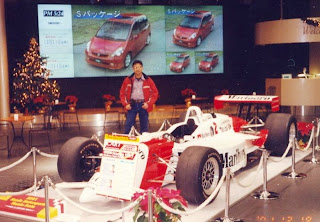Few of us know the fact that Toyota in Japan and Hindustan Motors (Maker of Ambassdor cars) in India started Car manufacturing almost at the same time around half-a-century ago ... i don't remember the year. TODAY we all know the progress made by both of them ... Toyota is going to be No.1 Auto-maker in world and where Hindustan Motors is now ?

Is this attract any argument that Japan's postwar growth has anything to do with management theory ? Japan's economy may have sputtered on the macro level during the early 1990's, but many of its factories and businesses remain awesome global powerhouses. How has Japanese management evolved?

Is this attract any argument that Japan's postwar growth has anything to do with management theory ? Japan's economy may have sputtered on the macro level during the early 1990's, but many of its factories and businesses remain awesome global powerhouses. How has Japanese management evolved?
After all, the average salaryman, relaxing at the end of a 10-hour day with Yakitori and sake, hardly spends his time talking about Drucker-san and Peters-san. Indeed, critics of management theory happily point out that Japan has only a few business schools, none of them very prestigious, and that, 30 years after arriving, Western consultancies are still struggling to make ends meet. It is because they do not have to pay the consultancies' inflated fees, the argument goes, that companies have more money to devote to "real" investment; and because they are not tempted to follow the latest management fashions that they can develop a coherent, long-term strategy.
The skeptics are right in one respect. Japan has so far produced only one first-division guru of its own, Kenichi Ohmae (though a generation of young pretenders is emerging). Many of the "gurus" who appear in this article are business people, rather than professors. Nevertheless, they have thought about management just as broadly as Drucker, Peters and others have, and their names are no less associated with theories on how to run businesses.
Moreover, in their central criticism, the skeptics are plain wrong. Japan owes a huge debt to management theory -- in particular, to a group of American theorists whose ideas inspired the Japanese to come up with "lean production." In the best study of that revolution, "The Machine That Changed the World," James Womack, Daniel Jones and Daniel Roos present their conclusions in no uncertain terms: "Lean production is a superior way for humans to make things. It provides better products in wider variety at lower cost. Equally important, it provides more challenging and fulfilling work for employees at every level, from the factory to headquarters."
Lean production was the offspring of a set of ideas about quality that Japanese businesses first encountered during the postwar occupation by the Americans. In a nutshell, these ideas focused on the importance of getting things right the first time rather than spending a lot of time checking afterward -- an obvious enough notion but one that went against the grain of the standard corporate model of the time, which assumed that quality was something you checked after you had built your motor car or other complicated product. Indeed, you had a quality department to take care of that very thing.
Even today, Japanese managers speak of Joseph Juran, A.V. Feigenbaum and, particularly, W. Edwards Deming in the same hushed tones that people normally reserve for a deity. Since 1950, an annual Deming Prize has been awarded for excellence in manufacturing, and winners are featured on Japanese television. Having been more or less ignored in America in the early 1950's, Mr. Deming and his friends were given the red-carpet treatment in Japan. Wherever they lectured, the halls were packed to the gods with engineers and production managers. Whatever they wrote was immediately translated into Japanese and devoured by managers the length and breadth of the country.The Japanese realized that their goods were hopelessly shoddy by international standards. They were also awe-struck by the might of the American economy and the sheer profusion of American products. So American gurus who were willing to visit Japan and talk about quality were manna from heaven. Even so, there were specific reasons why Mr. Deming's ideas seemed so attractive in Japan. Businesses in a grotesquely overcrowded country do not have the space to keep large quantities of inventory hanging around for months. After the war, Japan could not afford to waste precious raw materials on throw-away products or inferior machinery. Japan also lacked the migrant workers who provided Henry Ford with his factory fodder; and a surge of industrial unrest made it clear that Japanese workers were no longer willing to be treated as mere production costs. Perhaps only a nation that loves sushi could have such an instinctive understanding of "just-in-time" delivery.
After this long introduction & back-ground, I will be sharing this interesting topic in 8 parts in the coming days.
Enjoy, Learn & Practice this Art of Management both in your professional & personal life.
Cheers ....!!





